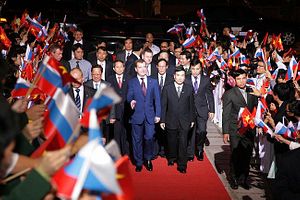Earlier this week Russian Prime Minister Dmitry Medvedev paid a visit to Vietnam and Thailand, meeting with his Southeast Asian counterparts and settling a handful of deals. But the trip’s biggest highlight wasn’t the trade deals, it was the messaging. Fyodor Lukyanov, editor-in-chief of the journal Russia in Global Affairs, is quoted in The Moscow Times as saying the trip was a statement that “for Russia, Asia is not just China.”
The message to the United States can be summed as this: Russia can pivot too. Last May, Russia signed a $400 billion energy deal with China in a move that made waves in the West. Following closely on the annexation of Crimea, Russian scholars categorized the China deal as a course correction from previous Russian Eurocentrism. From The Moscow Times article:
“This is a signal that Russia is starting to overhaul its policy, which until this time was limited by Western-centrism,” Lukyanov said. “The [Ukraine] crisis gave the push that was needed.”
Starting in Vietnam, Medvedev met with the country’s four key leaders: Prime Minister Nguyen Tan Dung, President Truong Tan Sang, Chairman of the National Assembly Nguyen Sinh Hung, and the Communist Party General Secretary Nguyen Phu Trong. This year, the two countries are celebrating 65 years of diplomatic relations.
The visit’s biggest deal was the promise that later this year a free trade agreement between the Russian-led Eurasian Economic Union (EEU) and Vietnam will be signed. Russia hopes the deal will be a step toward reaching a similar accord with ASEAN. Medvedev said that the two sides “have agreed on most contents of the agreement.” Over the next five years, he predicted, Russia’s trade with Vietnam could quadruple to $10 billion. Two-way trade between Russia and Vietnam amounted to $2.5 billion last year.
While the trade deal remains unsigned, several other deals were completed during Medvedev’s visit to Vietnam, including the agreement by Gazprom Neft, the oil arm of Russia’s state energy company Gazprom, to buy 49 percent stake in Vietnam’s Dung Quat refinery.
Medvedev’s visit to Thailand was the first by a Russian prime minister in 25 years. Thailand, on diminished terms with the United States following the May 2014 coup, welcomes Russia’s engagement. As with Vietnam, $10 billion seemed to be the magic number.
“We exchanged opinions on how to boost trade to $10 billion next year,” General Prayut Chan-o-cha said in a statement read to reporters after his meeting with Medvedev.
The Russian state-down defense company Rostec also made a deal to purchase at least 80,000 tons of rubber from Thailand, the world’s largest rubber exporter. Russian Trade Minister Denis Manturov said this purchase would be four times more than Russia had planned to buy in 2015 and that Rostec would use the rubber to make tires.
Manturov told Reuters that Russia was feeling out Thai interest in the purchase of military equipment. Manturov didn’t comment on new defense deals, but did mention that the Royal Thai Air Force is scheduled to receive the first of three Sukhoi Superjet passenger aircraft in late 2016 or early 2017.
“Our friends from the Western part of the world are ignoring Thailand,” he said.
The Russian delegation’s visit to Thailand came a week after the country lifted martial law, only to replace it with something regime critics say is much worse.
































